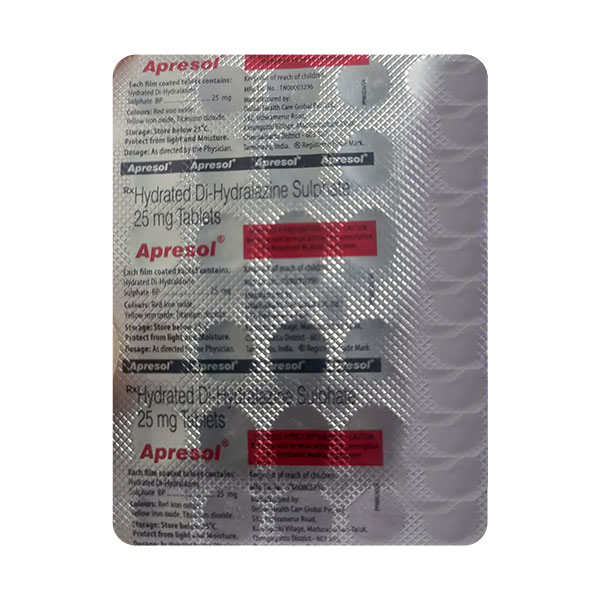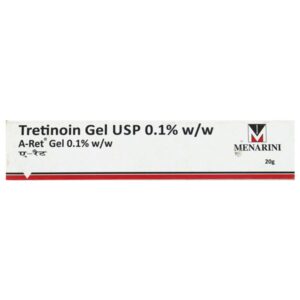APRESOL TABLET 30S
KEY BENIFITS,
- Blood Pressure Control: Apresol Tablet helps in lowering blood pressure by dilating blood vessels, which reduces the resistance against which the heart pumps.
- Heart Failure Management: In some cases, it may be used in the management of heart failure to alleviate symptoms associated with decreased cardiac output and increased peripheral resistance.
- Angina Relief: Dihydralazine can also be used to relieve symptoms of angina (chest pain) by dilating coronary arteries, thus improving blood flow to the heart muscle.
₹247.59 ₹291.28
Product Introduction:
Apresol Tablet contains Dihydralazine as its active ingredient. Dihydralazine is a vasodilator medication used primarily for the treatment of hypertension (high blood pressure). It works by relaxing and widening blood vessels, allowing blood to flow more easily and reducing blood pressure.
Apresol Tablet works by relaxing and enlarging certain small blood vessels so that blood flows through them more easily. It may be taken with or without food, preferably at the same time, each day. You must follow your doctor’s instructions exactly, taking all the prescribed medicines, in the right amounts, each day. These medicines will help keep your blood pressure down. Do not skip any doses. If you forget a dose of Apresol Tablet, wait until it is time for your next dose, then continue with your regular schedule. Do not stop taking it, or any of your other high blood pressure medicines, without checking with your doctor.
Apresol Tablet is generally safe and suitable for most people but has some potential side effects. The most common are headache, loss of appetite, nausea, vomiting, diarrhea and increased heart rate. Talk to your doctor if you are bothered by side effects or they do not resolve.
Benefits:
- Blood Pressure Control: Apresol Tablet helps in lowering blood pressure by dilating blood vessels, which reduces the resistance against which the heart pumps.
- Heart Failure Management: In some cases, it may be used in the management of heart failure to alleviate symptoms associated with decreased cardiac output and increased peripheral resistance.
- Angina Relief: Dihydralazine can also be used to relieve symptoms of angina (chest pain) by dilating coronary arteries, thus improving blood flow to the heart muscle.
Side Effects:
Common side effects of Apresol Tablet may include:
- Headache
- Dizziness
- Flushing
- Nausea
- Fatigue
Less common but more serious side effects may include:
- Hypotension (low blood pressure)
- Reflex tachycardia (rapid heartbeat)
- Lupus-like syndrome (joint pain, fever, and skin rash)
- Drug-induced systemic lupus erythematosus (DILE)
- Drug-induced hepatitis
Usage Guidelines:
- Dosage: The dosage of Apresol Tablet is determined by the healthcare provider based on the individual’s medical condition and response to treatment.
- Administration: The tablets are usually taken orally with or without food, as directed by the physician.
- Duration: Follow the prescribed duration of treatment. Do not stop taking the medication abruptly without consulting your doctor.
- Missed Dose: If a dose is missed, take it as soon as remembered. However, if it is almost time for the next dose, skip the missed dose and continue with the regular dosing schedule.
- Overdose: In case of overdose, seek immediate medical attention or contact a poison control center right away.
Drug Interactions:
- Other Antihypertensive Agents: Combining Apresol Tablet with other antihypertensive medications (e.g., beta-blockers, calcium channel blockers) may result in additive blood pressure-lowering effects.
- Alcohol: Avoid or limit alcohol consumption while taking Apresol Tablet, as it may increase the risk of side effects such as dizziness and hypotension.
- Monoamine Oxidase Inhibitors (MAOIs): Concurrent use with MAOIs may result in exaggerated hypotensive effects. Caution is advised when combining these medications.
Always consult your healthcare provider or pharmacist for comprehensive information about potential drug interactions and side effects specific to your medical history and current medications. Follow their instructions carefully for safe and effective use of Apresol Tablet.
SAFETY ADVICE

Alcohol

Pregnancy

Breast feeding

Driving

Kidney

Liver
| Weight | 0.5 kg |
|---|---|
| Dimensions | 10 × 10 × 10 cm |
Related products
-
Medicines
A RET 1% GEL 20GM – Top Quality Tretinoin (0.1% W/W) Skincare Solution
0 out of 5(0)MARKETERA. Menarini India Pvt LtdSALT COMPOSITIONTretinoin (0.1% w/w)STORAGEStore below 30°CKey Product Features:
- High Efficacy: Tretinoin is known to work at the cellular level, improving the appearance of your skin and providing a healthy glow.
- Versatile Use: Primarily used for treating acne, it also aids in reducing the appearance of fine lines, wrinkles, and skin discolouration.
- Easy Application: The 20 gm gel format makes it simple to apply, ensuring an even spread over the affected areas.
SKU: n/a



